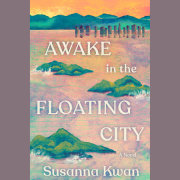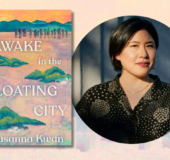High up in Unit 7763, each night slid in like an oil spill, filling the hours with sludge and shine until it seeped into another day. Bo was carrying on a long solitude here, stranded in the studio apartment she rented, one island among hundreds in this building, in a city inundated by rain, so saturated it could be called drowned.
The rain had kept on for seven years. It slowed some days but never stopped. Overnight, it seemed, the city had transformed into a rainforest. Vines that ran from roof to ground sucked up the water and sent out shoots and tendrils. The skyline brightened from gunmetal to green, softening the sharp edges. A steward on Tamalpais, she imagined, must have seen the sudden verdant thumb of land to the south, dividing sea and bay. Below, streets transformed into rivers, and the rivers blew out windows, tore doors from their frames, widened into buildings through the new openings. The water took down statues and leveled groves, carried entire families away. People fled or drowned—or moved to higher ground, where they relearned how to live in the city they’d known as home, a place the rain had claimed.
Today the quiet was punctured by ringing. Her cousin, Jenson, had chartered a boat, in part for her overdue evacuation, and it was scheduled to depart in two weeks. He’d been calling at least daily from British Columbia with reminders: the boat would leave at noon sharp; she should bring only the essentials; anything else could be replaced up north. She listened until he was done recording his message.
Everyone she knew had left by now, gone to Greenland or Siberia or Maine—inland, north, overseas, wherever there was an opportunity. In their messages, they asked, with the patronizing concern of the secure, how she was doing, if their family homes were still standing, when she might move or at least try to visit. They sent birth announcements and exhibition announcements, video footage of cities that had risen in just a few short years, the occasional rumor of looming water wars where they lived. Mostly they avoided mention of the refugee camps that now lined the routes of migration that had emerged following mass displacement, the river towns engulfed by monsoons, the unprecedented temperatures that had evaporated reservoirs, fried vegetation, and filled the morgues. Bo was embarrassed not to share their urgency to leave. They implored her to find a better, safer place, and she assured them she was making plans, tried to see what they saw, but couldn’t.
An electric hum pitched down, and a moment later the power went out. Silence. With both hands, she lifted her preferred plate from a shelf and set it on the counter noiselessly. The swells of uncertainty paused as she pulled a few dry nubs from the mycelium wall in her kitchen and arranged an ascetic meal on the cobalt-glazed ceramic. The flowers on the trim contrasted with any food: the mushrooms, a potato, a broccoli stalk, or a halved egg, wreathed in blue. She chewed and swallowed. Then, with absolute care, as if handling glass, she washed and dried the dish and returned it to its place. A tarry feeling returned, starting low, in her legs, and as it filled her she felt soothed by its familiarity, like molten night pulling her to the floor.
When the sky began to darken, she forced herself up to the roof. The last two years, her twice-weekly trips to the market had been tiny anchors to the world. Life was going on outside. She’d make herself walk the aisles, trying to appreciate feeling, not just hearing, the rain. And she’d buy food—even without much appetite, she had to eat.
The rooftop economy had emerged in densely populated sectors as the flooding had worsened. Nimble street vendors were the first to move their operations up, followed by small businesses with storefronts. Together they pushed the city to expedite relocation permits and build bridges to replace the wrecked roads.
It didn’t take long for everything else to follow them up. The school district cordoned off areas for recess and after-school programs. The parks department put on movie nights. Talks, concerts, and community meetings took place under the shelter of portable bandshells. But even then, there was a sense that it wouldn’t last. Activity had diminished steadily, as expected, especially in the last two years, and only a third of the vendors remained now. Still, everyone left moved along the roofs, by necessity and for pleasure, for groceries and exercise and socializing, and to get from one place to another.
By habit Bo made her way to the citrus stand, past commemorative murals and cairns, her arm shielding her face from the drops. Her favorite vendor stacked his table with glowing glass jars, a wall of sun against the gray sky. An illusion of bounty. When his greenhouse lemons ripened, he preserved them in salt and oil. He sold them throughout the year, but she rarely bought any; mostly she just came to look.
“Slice some up if you have a pigeon to roast,” he’d suggested on her first visit, “or nibble on a sliver if you’re craving something sharp.” He talked just the right amount, as though sensing correctly that she was unaccustomed to people. Today he said nothing when he saw her but pointed at a basket of finger limes labeled help yourself. She chose one and nodded in thanks. She pushed herself to continue and bought several bundles of spinach from the next table over. They weren’t much, but she could stretch them across a few meals before they went bad, delaying her next errand. As she made her way back to the elevator, she estimated she wouldn’t have to leave her apartment again for three days.
In the vestibule, she did her ritual scan of the bulletin board, noting any new flyers of the missing and checking for the laminated photo of her mother she had posted two years earlier, just after the big storm. Plain lined face, easy smile, gray pixie cut—it was still there.
Back in her apartment, she laid the food out on a cutting board and played the new message that had come in while she was out: Jenson would ride down on the boat and make the journey back north with her. Those first months after the big storm, he’d begged her to return with him. He’d given her space, said he understood it wasn’t easy to leave home. But two years later, her doubts had curdled into paralysis. The situation was dire. Her inaction would be the death of her, he said. He had no choice but to decide for her, to come personally to escort her out.
Not much to do in these final weeks, little to pack, no one to say goodbye to. Now she flattened herself on the floor between the canvases stacked against the wall and the rusted toolbox that held her brushes and knives, paints and rags, lifeless things, none of it touched in over two years, none of it worth taking with her. The clawing inside subsided a little. She did her best to stay perfectly still.
The next week, while she was assessing what to pack, a note slid under her door. I need help, it read. Three days a week, afternoons. Can pay in cash. Signed in a scrawl: Mia, Unit 5109.
The neighbor. For a couple of years, just after the rain began, Bo had been a caregiver for Ricardo, a man who had lived on the fifty-first floor. The old woman who had lived next door to him must have noticed Bo coming and going back then, mops and bags of produce and packs of adult cloth pull-ons in hand.
Patches of the woman’s life had come through the walls and windows as Bo had worked: the static from her Cantonese programs, wafts of frying garlic, tones of complaint. Bo had often wondered about her, how she’d come to live alone here, if she had any family, but when she’d asked Ricardo, he’d said he didn’t know much. He’d heard from another resident that she’d arrived in America as a young mother in the years following the Second World War, long before he was born. A supercentenarian, they called people like her. A handful of the very old—those who had survived well past a century—were known to live in units throughout their building. Advancements in medicine kept extending life expectancy, but around the world, especially in cities, the elderly found themselves abandoned by family to survive personal and regional crises alone.
Bo had stayed with Ricardo until his body had given up. She’d waited until the mortuary service had collected him for water cremation before going to the clay fridge, as he had directed, and locating his will, sealed in a plastic bag, deeding his remaining accounts to her. Not surprising, since he had long been alone, but she was neither family nor friend—just contracted labor.
It was enough to live on for a year, or several if she was frugal. This was what she’d hoped for since she was twenty: the money meant she didn’t need to find a new gig—she could simply paint. But she’d found that she struggled to create with that freedom; something had changed, requiring effort she didn’t know how to expend. She worked dutifully, made aimless, soulless marks while she awaited that elusive spark. As the months passed, her patience frayed and panic surfaced, coating her eyes and skin and everything she touched with a film of failure. She’d made a mistake. Her mother was right: she’d been given a gift but had wasted it. Clinging to the belief that there was meaning in the work, she’d insisted on staying to see it through. Then came the storm surge, then the long stillness that followed. The money shrank. The rain kept on.
She left the old woman’s note on the floor and attended to the plan ahead. She packed some clothes, set her suitcase by the door, and waited for the day when she would walk down to the dock. The note tugged at her like a magnet, but she tried to forget it. Two or three days passed, maybe another.
The idle, fearful years had made her mind loose. Without schedule or focus, the hours had scattered. Her grasp of time had dimmed; she’d lost all sense of how the day passed outside her apartment. She had the feeling that life was spinning away from her on a widening orbit.
As a child she’d noticed that each day followed the one before, like breaths. Her mother had hung two clocks in their home—buy one, get one—the first over the mantel of a fireplace that didn’t work and the other in the bathroom as a reminder to keep their showers brief. From the table where she ate, studied, and drew, Bo could hear both as they marked the seconds, just a hair from synchronization, pushing time forward like a damaged metronome, drawing her attention to her own heartbeat as it picked up speed and turned into a forceful knocking rhythm that drowned out the clocks.
Now she sensed the days going by through slivers and swatches of light moving between the leaves that had draped her window ever since she’d stopped cutting back the vines. She sustained a vague memory of the satisfaction of operating on scripted time.
A former painting teacher of hers, a widow, reported in a letter that her own dark period had lasted more than three years after her beloved had died. Three years before she could detect tamarind in a marinade or eat with any pleasure. Three years in which she declined to trim her nails, instead either growing them into talons or chewing them down. The black dog—that was what she called it.
It didn’t help that the cycle of a year had distorted into a single interminable season.
In the early days of rain, every change had stood out. Bo had been new to the building then, drawn in by the low rent and central location after almost eight years on the west side in a poorly maintained live-work studio that she’d outgrown but hadn’t known how to leave until it was condemned, the decision made for her. From her new apartment, she anxiously watched the city transform into something unrecognizable—unfathomable, at first, when for years they had known only drought and the threat of more drought. She drew daily, capturing the details, still believing the rain would end soon. Ceramic water-storage tanks filled and overflowed. Black rubber irrigation snakes secured to the perimeter of rooftop garden plots swelled and split. Farmers tried to adapt, sowing and harvesting according to this swing in the weather. Food supplies became unpredictable. People were robbed of their groceries. Sinkholes opened, like the neighborhood’s collective hunger on display in the street. Mouths to swallow a city up. Inside, thick runoff stained the walls and left deposits. Streaks of copper ran down sodden curtains. She woke to putrid smells carried up through the vents from the boiler room, the basement, the street: skunk, mold, sewage, fermenting garbage. The green that blanketed the city drank up the water on its millions of fingers, and what wasn’t absorbed poured down and ran into the gutters. She stopped running into other tenants on her floor and realized that most of the units had gone vacant. She watched as residents began to flee, the first of many waves of exodus, and still, the looping footage of floods on the news shocked her, no matter that she’d seen those very scenes on her own block.
The streets ulcerated into potholes in the months that followed. A moonscape. A city on a sheet of Swiss cheese. Even roads built with self-healing asphalt couldn’t withstand the deluge. Beneath the carpets of tar, the sand that held up the streets swept away in rivers of muck. Before it became futile, a contingent of concerned residents, the ones who appeared on local public broadcast feeds delivering grating, impassioned speeches on the neighborhood effects of this or that ordinance, organized to draw attention to the potholes. From the window where she’d set up her drafting table, Bo noticed the crude images, the kind found in high school bathroom stalls, drawn around the holes in spray paint. She began to work neon colors into her own paintings, using an airbrush. Then she watched as a crew of people—cloaked from the drizzle in rain ponchos, armed with bouquets and hand trowels—theatrically filled each new, still-small hole with potting soil and planted hibiscus blooms. She tried to track their campaign, searching community board posts for updates and staring down at the street each day. Finally, she was rewarded. When a particularly large pothole went untended by the municipality for over a year, they threw a birthday party for it, added streamers to the orange tape that bordered the current edges, dug forks into a cake piped in frosting. Alone in her apartment, watching through binoculars, she pounded her fist on the window and cheered along with them.
Copyright © 2025 by Susanna Kwan. All rights reserved. No part of this excerpt may be reproduced or reprinted without permission in writing from the publisher.






